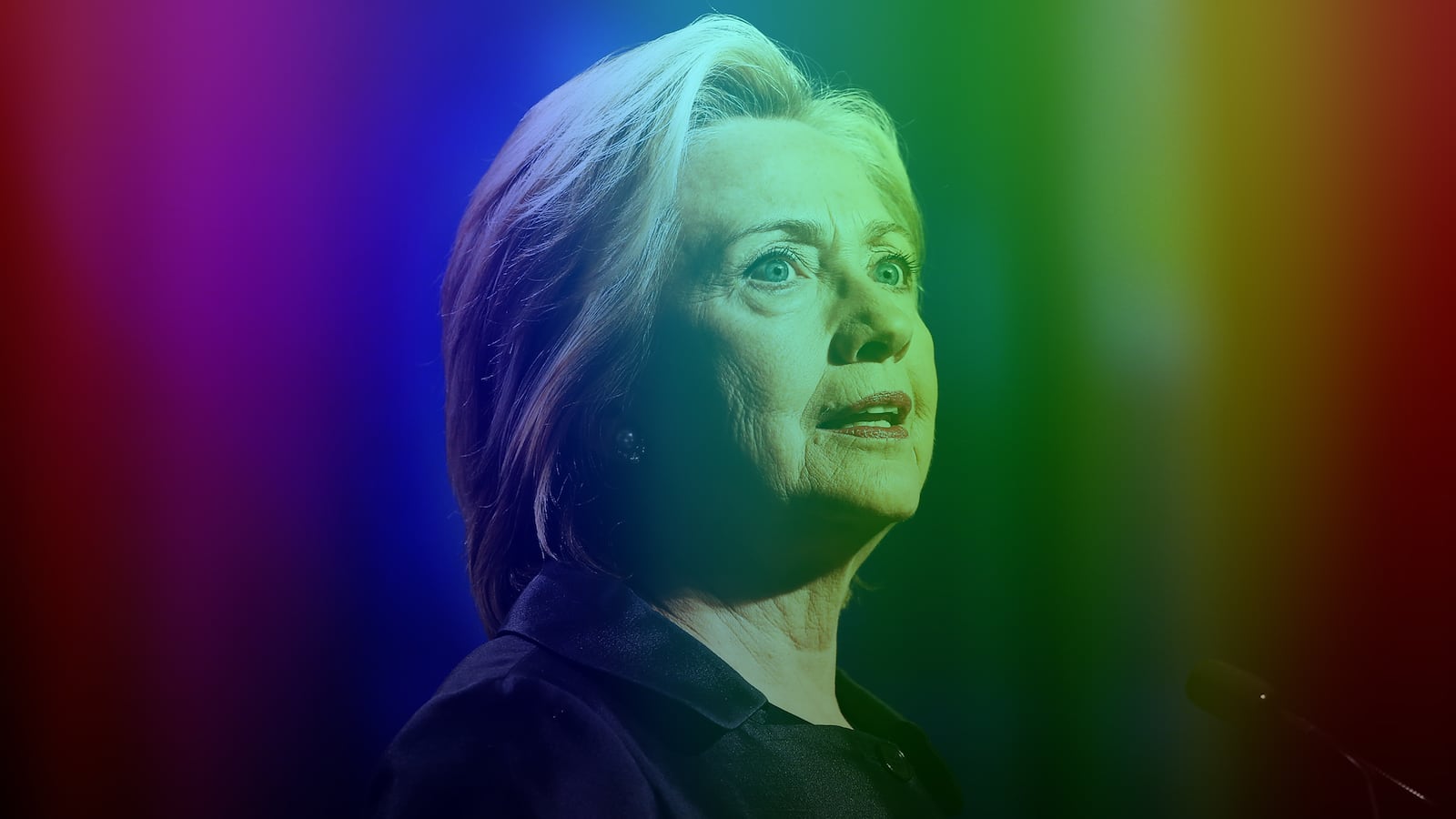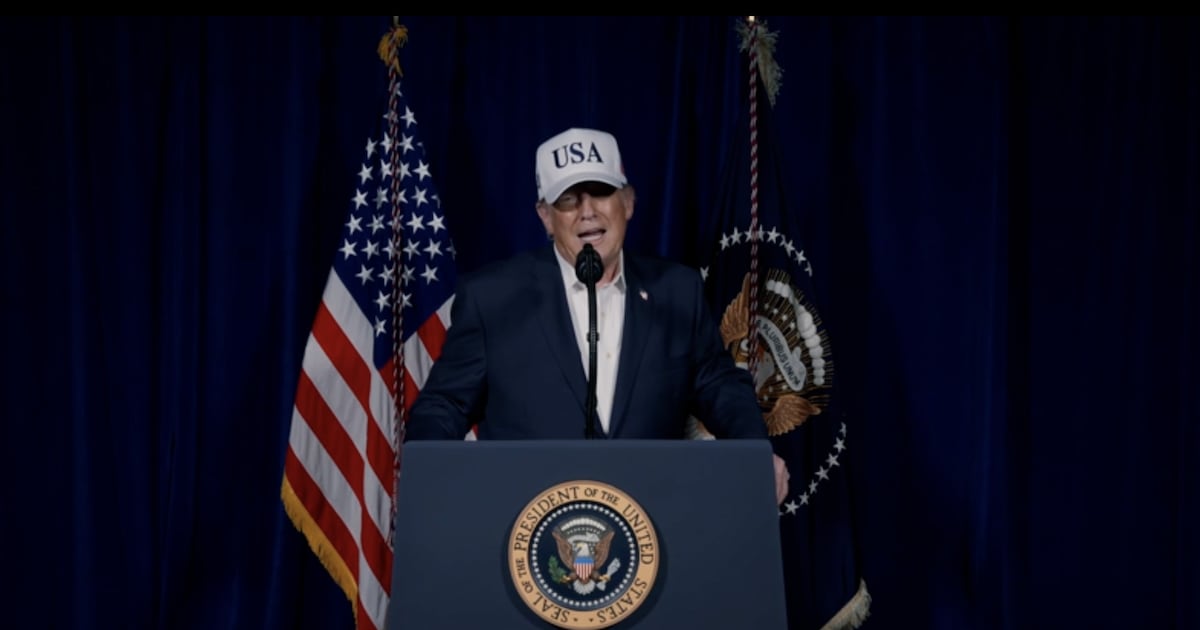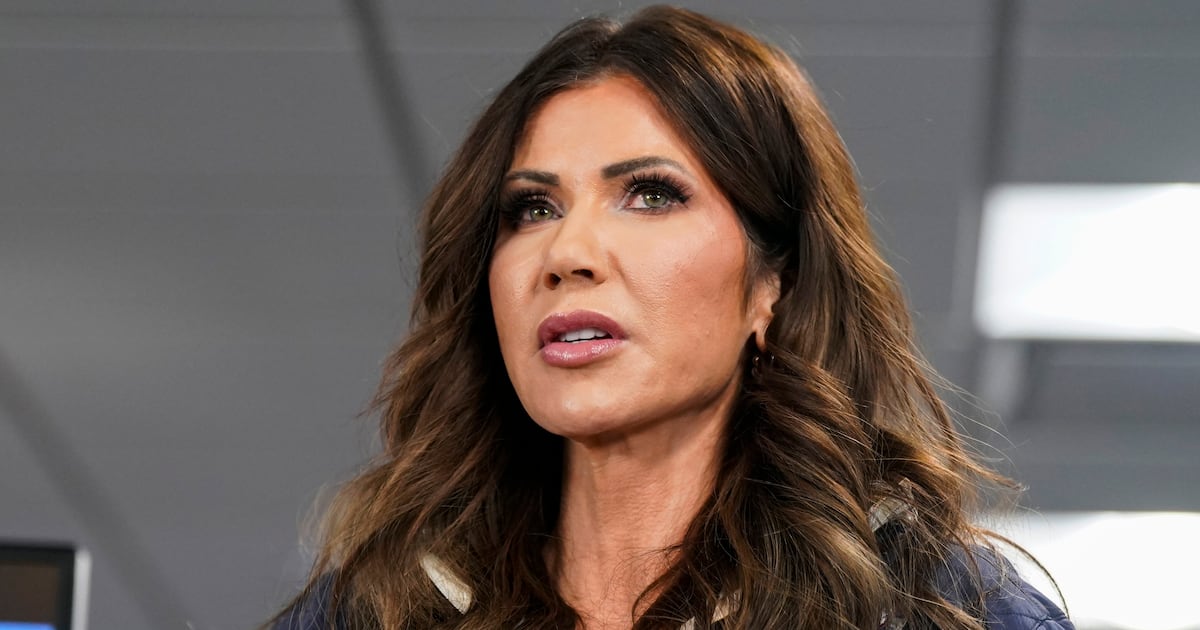Gay men love Hillary Clinton. If only she felt the same way in return.
Hillary, it’s now been reported, was not “comfortable around gay people who were kind of acting out, or pushing her to the limit. She did have general discomfort.” Those are the words of none other than Bill Clinton as related by Taylor Branch, a close friend who recorded dozens of interviews with the former president throughout the 1990s. Although Clinton kept the cassettes, Branch recounted the conversations into a tape player immediately after each interview. Alana Goodman of the Washington Free Beacon recently unearthed the recordings.
According to Bill Clinton, who admitted to having “much more contact in my life with gay people than Hillary has,” the former First Lady had a “general discomfort” with gay-rights issues and was “really a little put off by some of this stuff.”
Perhaps that’s one reason why it took her until 2013 to publicly back gay marriage. And perhaps this helps explain why, during her husband’s administration, she didn’t speak out against the travel ban on people with HIV, the Defense of Marriage Act, or the military’s “Don’t Ask, Don’t Tell” policy, all of which he signed into law.
Hillary is renowned for inspiring fierce devotion among admirers. The latest tranche of her email correspondence, sent during her time at the State Department, is a catalogue of sycophancy and brown-nosing on the part of subordinates.
But it’s Clinton’s gay male support base—and a white, affluent subset in particular—that calls out for some sort of sociological study. Unlike the enthusiasm of her women backers, the zeal expressed by so many of my fellow gays for the former Secretary of State and second-time presidential aspirant (described by New York Times Clinton campaign correspondent Amy Chozick as “primal” in a 2014 piece) cannot be rationalized as identifying with a fellow female’s political struggles. The gays’ passion, though, is similarly gender-based: Clinton is a diva, and they are her devotees.
“In her decades in the public eye,” Chozik wrote last summer, in yet another trend piece examining Clinton’s gay appeal, “she has developed a certain pop culture status, particularly among some gay men who identify with her triumphs over adversity, her redemption, and her evolving personal style.”
To me, there’s one T-shirt that says all you need to know about Clinton’s gay male base: I’d Bottom for Hillary.
Lying prostrate, face down in the pillow: Is there a better analogy (pun intended) for the gay Hillary Clinton supporter these days?
Bottoming is an act of complete and utter physical surrender to another. Characterizing one’s admiration for Hillary Clinton as akin to being sodomized gives a whole new meaning to the doctrine used to describe her style of diplomacy, “leading from behind.”
The submissiveness inherent in being the passive sexual partner encapsulates Clinton’s relationship with her legions of gay fans. “Bottoming demands trust, admiration, confidence, loyalty, respect, enthusiasm and hope,” the twentysomething San Franciscan who created the slogan, known only as “Ryan,” told the Huffington Post this year. “Those feelings we have toward Hillary.”
The establishment of Hillary as a gay icon roughly coincides with her emergence onto the national scene, namely, the famous joint television interview she did with Bill at a pivotal moment in his first presidential campaign. Addressing the first of what would become her husband’s endless “bimbo eruptions,” Hillary declared to 60 Minutes’ Steve Kroft, “I’m not sitting here some little woman standing by my man like Tammy Wynette.” (She did, however, and would continue to do so, for the rest of her life.) With that remark, her status as wronged woman boldly standing up on her own—signature trait of the gay icon—was established, as was her place in the hearts of gay men nationwide.
Hope, Arkansas, native Chad Griffin is one such individual. “She has had to overcome a whole lot of setbacks and personal attacks, literally, since she came into public life,” the former Clinton aide and current president of the Human Rights Campaign (a gay-rights organization whose acronym coincidentally matches Hillary’s initials) told the Times. “If you look at the LGBT experience, there are a lot of parallels.”
By the end of her tenure as first lady, Hillary had become one of the most divisive figures in American politics. It was clear on what side most gay men stood. “Hillary, Viva La Diva!” proclaimed Michaelangelo Signorile for The Advocate in 1999. Referring to Hillary by just her first name, he noted, gays had elevated Clinton into their pantheon alongside Barbra, Liza, and Cher. They overwhelmingly preferred her to Barack Obama in the 2008 California and New York primaries, the only states where voters were asked their sexual orientation in exit polls.
But it wasn’t until the 2012 creation of the Internet meme “Texts from Hillary” that she achieved true camp idol status. Inspired by a photo of a sunglasses-clad Clinton casually reading her Blackberry while sitting on a military transport plane, two gay PR flacks paired that image with those of other famous world leaders and personalities checking their smartphones, overlaying them with the imagined text of their digital exchanges. “Daily Show this week?” inquires Jon Stewart. “Already booked Colbert,” Hillary blithely responds.
Appropriately concocted at a gay sports bar, this obsequious clickbait immediately went viral, and Clinton invited its creators over to Foggy Bottom for a chummy photo shoot. In light of her use of a private email account to send classified information, “Texts from Hillary” isn’t so funny anymore.
Not that many of Clinton’s gay enthusiasts care about such things as government transparency or the protection of state secrets. “Clinton’s LGBT backers unfazed by email controversy” reads the headline of a recent story in the Washington Blade, which quoted a series of prominent gay Clinton buffs waving off the scandal as a predictable product of “false reports in the media” and the “Republican noise machine.”
Listening to Hillary’s gay advocates, one gets the sense that, even if they did concede her flouting federal law, it would be FABULOUS. Indeed, it’s Clinton’s disregard for the rules that seems to endear her ever more to gay fans. Each and every act of dubious legality is just taken as evidence of her outrageous, defiant personality. The unfathomable greed is no more than a taste for bling, after all—what proper gay man doesn’t appreciate the finer things in life? Behavior that others find appalling, Hillary’s gays see as further validation of her greatness. As “Bottoms for Hillary” creator Ryan writes on his website, “She is a bad ass bitch. She is the head bitch in charge.”
This is presidential politics as RuPaul’s Drag Race.
Perhaps this is why so many white, upper-middle-class gay men love Hillary. Their privilege insulates them from needing to care much about political substance (ask if they’re aware of their icon’s views on, say, Common Core).
Prime examples of her gay constituency are world’s luckiest roommate and New Republic owner/destroyer Chris Hughes, as well as his husband, failed congressional candidate Sean Eldridge, who recently hosted a fundraiser for Clinton at their 4,000-square-foot Soho loft.
The archetype, however, is David Brock. The right-wing turned left-wing smear merchant’s own “evolving personal style” (particularly his hair) rivals any of Hillary’s innumerable makeovers, and his journey of “redemption” from conservative axe-man to liberal truth-teller would make a heart-tugging torch song. An erstwhile antagonist of the First Couple, Brock’s latter-day conversion to the cause of Clinton Inc. has made him a very rich man, as he stands atop a web of “10 interlocking PACs and nonprofits,” according to the Times, devoted to trumpeting Clinton’s virtues and blitzkrieging her enemies.
Hillary’s popularity with this demographic goes deeper than mere partisan electoral preference. The gay male connection to Hillary is fundamentally emotional, stemming from personal identification with one, crucial aspect of her carefully cultivated public persona: the perpetual victim.
In Clinton, some gay men superficially relate to a fellow underdog, her battle against the “Vast Right Wing Conspiracy” evoking their own repressed trauma inflicted at the hands of adolescent tormentors. “We get her like we get our moms,” a spokesman for the Human Rights Campaign told the Times, essentially confirming the stereotype that gay men are the product of overbearing mothers and absent fathers. “We’ve seen the travails she’s been through and the fact that she’s not just a survivor but a conqueror.” If Hillary is Tracy Flick, her gay fan base is the chorus from High School Musical!
In the (second) Times trend piece about Clinton’s relationship to gays, George Chauncey, a Yale professor of American LGBT history, likened the nature of her popularity to that of Judy Garland, whose death by pills and liquor helped inspire the Stonewall riots. The “resonance of the long-suffering woman with older gay men, in particular, cannot be underestimated,” is how the Times paraphrased Chauncey’s explanation for her high standing among this cohort.
Practically, however, there is little reason why gay men should be so enthusiastically pro-Hillary. Neither she nor her husband—who signed “Don’t Ask, Don’t Tell,” an HIV travel ban, and the Defense of Marriage Act—have been great trailblazers for gay rights, where they’ve demonstrated the same cynical guile they do in every other realm of public policy or private life.
Though today fashioning herself a champion of LGBT issues, Hillary did not publicly back gay marriage until March of 2013. This avowal came two months after she stepped down as Secretary of State and nearly a year behind that of potential 2016 challenger Joe Biden, whose surprise declaration had the virtue of being uttered while still in office. (Fellow Democratic contenders Bernie Sanders and Martin O’Malley have backed same-sex marriage for decades and since 2011, respectively). As Dick Cheney was expressing support for marriage equality in 2004—albeit on a ticket in favor of the Federal Marriage Amendment—Hillary waxed righteously about the “fundamental bedrock principle that exists between a man and a woman, going back into the mists of history as one of the founding, foundational institutions of history and humanity and civilization.”
It was as rousing a defense of the traditional marital union as any ever expressed. Somehow, gay tastemakers never printed T-shirts offering oneself up as a sexual plaything for Dick Cheney.
To be sure, oleaginousness, frivolity, and a sense of loyalty that only a mafia capo or Scientologist could comprehend are traits hardly limited to Hillary’s gay supporters. As Ryan himself said, “NO! You do not have to be gay to be a part of Bottom for Hillary.”
The Washington lawyer and dictator-whisperer Lanny Davis would certainly qualify as just such a heterosexual “bottom for Hillary,” having written to her that “I consider you to be the best friend and the best person I have met in my long life.” He also referred to Clinton in the third person with the following mouthful: “my friend the great former junior senator from New York, Hillary Clinton, whom my friend Lindsey Graham once told me was the nicest and most effective person in the U.S. Senate!” So too should Sidney Blumenthal, the Doug Stamper of the Clinton clan, be included in a list of straight bottoms for Hillary—his catty, gossip-filled missives to her rivaling the bitchiness of most Project Runway judges.
The least that can be said for these men, however, is that they have a longstanding personal connection to Clinton and can leech great material gains through entrée to her power. The slavish fanboyism expressed by so many gays, for want of substantive reasons, is shallow and pathetic, an altogether fitting spectacle of a candidacy for which the motto “Bend over America” has become entirely apt.






